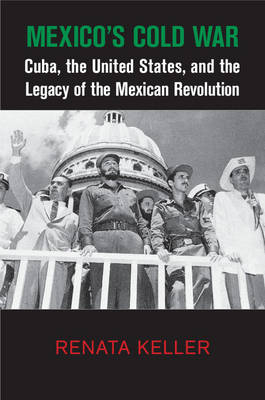
Mexico's Cold War
Cuba, the United States, and the Legacy of the Mexican Revolution
Seiten
2015
Cambridge University Press (Verlag)
978-1-107-07958-8 (ISBN)
Cambridge University Press (Verlag)
978-1-107-07958-8 (ISBN)
This book is a history of the Cold War in Mexico, and Mexico in the Cold War. It uses declassified Mexican and US intelligence sources and Cuban diplomatic records to challenge earlier interpretations that depicted Mexico as a peaceful haven and a weak neighbor forced to submit to US pressure.
This book is a history of the Cold War in Mexico, and Mexico in the Cold War. Renata Keller draws on declassified Mexican and US intelligence sources and Cuban diplomatic records to challenge earlier interpretations that depicted Mexico as a peaceful haven and a weak neighbor forced to submit to US pressure. Mexico did in fact suffer from the political and social turbulence that characterized the Cold War era in general, and by maintaining relations with Cuba it played a unique, and heretofore overlooked, role in the hemispheric Cold War. The Cuban Revolution was an especially destabilizing force in Mexico because Fidel Castro's dedication to many of the same nationalist and populist causes that the Mexican revolutionaries had originally pursued in the early twentieth century called attention to the fact that the government had abandoned those promises. A dynamic combination of domestic and international pressures thus initiated Mexico's Cold War and shaped its distinct evolution and outcomes.
This book is a history of the Cold War in Mexico, and Mexico in the Cold War. Renata Keller draws on declassified Mexican and US intelligence sources and Cuban diplomatic records to challenge earlier interpretations that depicted Mexico as a peaceful haven and a weak neighbor forced to submit to US pressure. Mexico did in fact suffer from the political and social turbulence that characterized the Cold War era in general, and by maintaining relations with Cuba it played a unique, and heretofore overlooked, role in the hemispheric Cold War. The Cuban Revolution was an especially destabilizing force in Mexico because Fidel Castro's dedication to many of the same nationalist and populist causes that the Mexican revolutionaries had originally pursued in the early twentieth century called attention to the fact that the government had abandoned those promises. A dynamic combination of domestic and international pressures thus initiated Mexico's Cold War and shaped its distinct evolution and outcomes.
Renata Keller is an Assistant Professor of International Relations in the Frederick S. Pardee School of Global Studies at Boston University.
Introduction; 1. The institutionalized revolution; 2. Responding to the Cuban Revolution; 3. Mexico's Cold War heats up; 4. Negotiating relations with Cuba and the United States; 5. Insurgent Mexico; 6. From Cold War to Dirty War; Conclusion.
| Reihe/Serie | Cambridge Studies in US Foreign Relations |
|---|---|
| Zusatzinfo | 2 Tables, unspecified; 1 Maps; 6 Halftones, unspecified; 6 Halftones, black and white; 3 Line drawings, black and white |
| Verlagsort | Cambridge |
| Sprache | englisch |
| Maße | 160 x 229 mm |
| Gewicht | 540 g |
| Themenwelt | Geschichte ► Allgemeine Geschichte ► Zeitgeschichte |
| Geisteswissenschaften ► Geschichte ► Regional- / Ländergeschichte | |
| Recht / Steuern ► EU / Internationales Recht | |
| Sozialwissenschaften ► Politik / Verwaltung ► Europäische / Internationale Politik | |
| ISBN-10 | 1-107-07958-6 / 1107079586 |
| ISBN-13 | 978-1-107-07958-8 / 9781107079588 |
| Zustand | Neuware |
| Haben Sie eine Frage zum Produkt? |
Mehr entdecken
aus dem Bereich
aus dem Bereich
Gewalt, Umwelt, Identität, Methode
Buch | Softcover (2024)
Spector Books OHG (Verlag)
36,00 €
der Osten, der Westen, der Zorn und das Glück
Buch | Hardcover (2024)
S. Fischer (Verlag)
26,00 €


